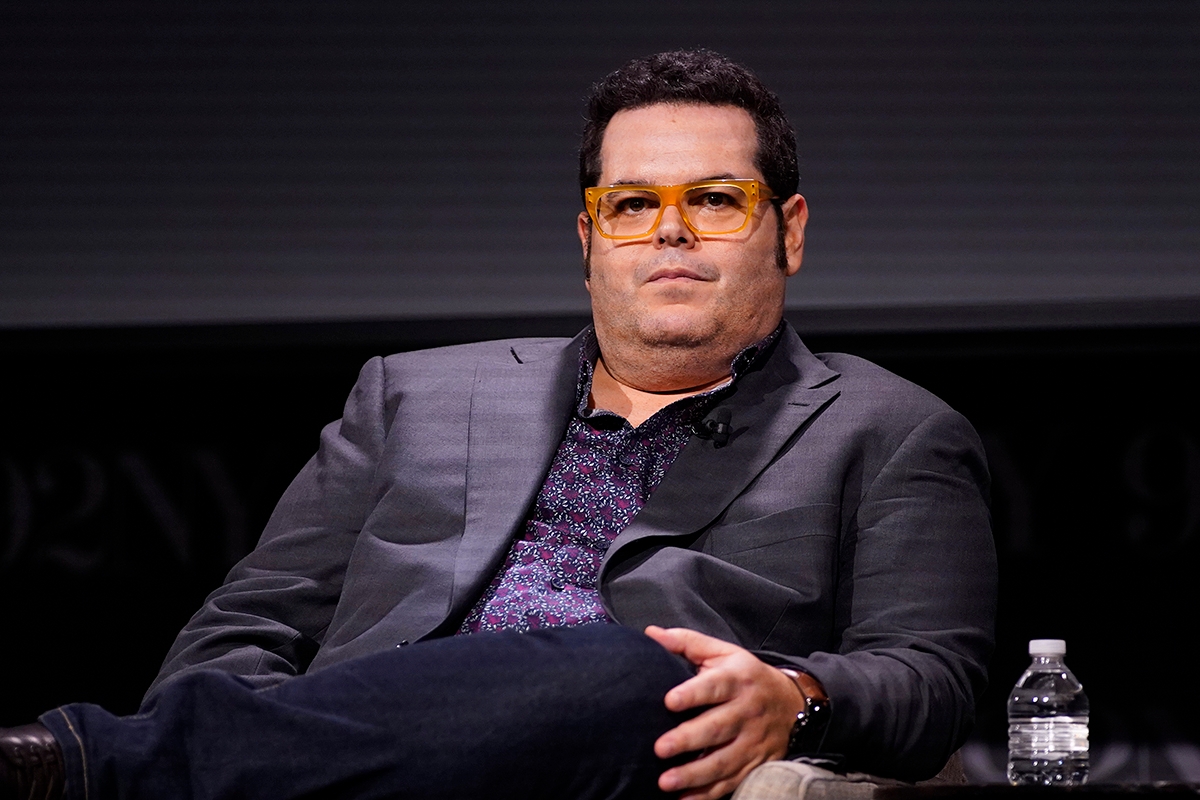Josh Gad’s new autobiography, “In Gad We Trust,” is, like the “Frozen” and “Book of Mormon” star, incredibly hilarious and very Jewish (its audiobook version even features Jewish comedy maven Mel Brooks). And so the press tour for the book, which came out on January 14, is obviously full of magical, funny and heartfelt Jewish tidbits.
On the “Late Show With Stephen Colbert,” Colbert brought up how Gad, who voiced Disney’s funniest and most iconic snowman, Olaf from “Frozen,” described his childhood as “Jewish ‘Narcos.'” Startled by the term, Colbert wondered what that entailed, quipping, “Smuggling matzah across the border?”
Gad, who is also behind the very Jewish comic book series “The Writer,” described his father as “a Jew born in Afghanistan who then moved to Columbia to start a business in Emerald mining.” He left their family when Gad was 6, which put him on a path to comedy, dealing with his Jewish mother’s depression after his father’s departure by making her laugh. That, he felt, was his superpower. “If I can take her misery away, I can do it for thousands of people at the Ed Sullivan theater,” he joked.
In the hilarious interview, Gad also recalled practicing acting exercises with a bath robe-clad Jeff Goldblum early in his career, and assured Colbert that said bath robe was secured so he “didn’t see any other Goldblums.” He mentioned a meeting with Jewish actor Sacha Baron-Cohen, who made him record a voice memo for his daughter as Olaf and then told Gad he wasn’t doing the signature voice quite right.
Last month, on a live recording of Jonah Platt’s podcast Being Jewish where he appeared alongside Ginnifer Goodwin and Marlee Matlin, Gad talked more deeply about his Jewish background and his own relationship with Judaism. At one point, Platt fact-checked his research about Gad’s origins, asking, “Correct me if I’m wrong: You grew up Modern Orthodox in Florida with a German mother, Afghan father who grew up in Israel, and grandparents who survived the Holocaust?”
“Beat that, guys. Was your childhood a game of Madlibs?!” Gad jokes with the audience.
“My mom was born in Germany at the end of the second world war in 1946, in a place called Biden Germany, to Evelyn and Joseph Greenblatt, my heroes, true superheroes. My father was a Sephardic Jew born and raised in Afghanistan,” Gad elaborated. His father lived there for 13 years and then, at some point, his parents were like, “Oh shit, we’re in Afghanistan, I don’t think they like us here, we gotta get out,” and so they left. “I was born and raised in South Florida. We went to a shul called Young Israel, the kind of shul that separated the men from the women,” he told Platt, joking that he was the “Shabbat child” for his older brothers, turning on the TV for them to watch “Smurfs” on Saturday mornings when they weren’t allowed to handle electricity.
“I had sort of a tricky relationship with Judaism growing up, because when I was about 5 years old, I found out that my dad had cheated on my mom; he had another family,” Gad explained. “And he was the Orthodox person, he was the one who bestowed this on us. We walked to temple every Saturday and I went to Hebrew school, and while I didn’t know everything, I knew that he had broken one of the 10 commandments, and I was kind of pissed as a kid.”
That discovery made him feel like his father’s Jewish identity was hypocritical and left him with a lot of resentment. He had a bar mitzvah, saying that he loved the ceremony but hated feeling bullied into studying his haftorah.
“Mine was a childhood of rules and regulations in Judaism, and the spiritual connection in Judaism came much later for me. When I was able to have that spiritual connection, then I really became a Jew,” Gad said. “That journey came my sophomore year when I played a character named Tevye, and through art, then I was able to fall in love with faith,” he movingly explained.
On “Colbert,” Gad mentioned how his father wasn’t there to see his love for theater blossom at Beit Shalom Jewish day school (“They do great work,” Colbert jested when Gad recounted that story. “They do great work, incredible stuff,” the actor agreed). But after 20 years of not seeing each other, he was able to see his son on the Broadway stage while starring in “Guttenberg! The Musical!” in which the actor plays a Broadway producer making a musical about the inventor of the printing press. Gad and his father sat together after the show and were able to reconcile and resolve so many of the things that transpired between them.
On Platt’s podcast, Gad got more serious, talking about how his experience on “Guttenberg!” was shaped by October 7 — the play opened on Broadway on October 12, but was in previews at the time of the attack in Israel. A central theme of the musical is antisemitism, and as the main Jewish person involved in it, Gad had to reign in the use of certain terms to be sure it didn’t make light of the issue.
Gad talked about intermarriage — how he worried that marrying his Catholic wife would break his Jewish grandmother’s heart, but how she eventually approved of their union before her passing a week before their wedding. His wife, Ida Darvich, is supportive of him raising their two daughters Jewish. Gad recalled how his grandfather used to talk about being in the camps with Italian Catholics and seeing their sense of communal anguish. He also said the desire to speak up in support of the Jewish community and against antisemitism was instilled in him early on — and that he never plans to stop acting on.
“I’ve been advocating passively,” he explained. “I’ve always felt like it was something I had to do. I had to advocate, I had to talk about Judaism. I had to communicate what it means to be Jewish — communicate, and I don’t say this jokingly, to others what it means to be antisemitic, because I think a lot of people don’t necessarily realize they’re engaging in antisemitism.”
“It’s heartbreaking to stand with others firmly and unequivocally and then hear their silence when it’s your turn. It’s really tough,” he went on, saying that his advocacy always “comes back to the fact that nobody spoke out for my grandparents.”
“Their lives were taken from them,” Gad said. “First they were forced into compounds, ghettos and stripped of their jobs, stripped of their identities, and then stripped of their families, stripped of their clothing, stripped of their hair, stripped of their legacy, and taken to barbaric camps where, at best, you would starve and leave, with maybe one or two family members, and at worst, it would be the end of your name. That was my legacy. That happened two generations ago, and I’m not gonna sit here and fucking let that happen again. So that’s why I speak out, because I have a microphone, because I have a platform, because I know the consequences of not speaking out.”
“I can’t tell you how many times somebody comes up to me on the street and says thank you. Thank you for using your your platform. And it makes me sad that people need to thank me, because you shouldn’t have to. I shouldn’t have to be doing this,” Gad said. “But I promise to keep doing it as long as I can and as long as I have to, which may be, at this point, my whole life.”








